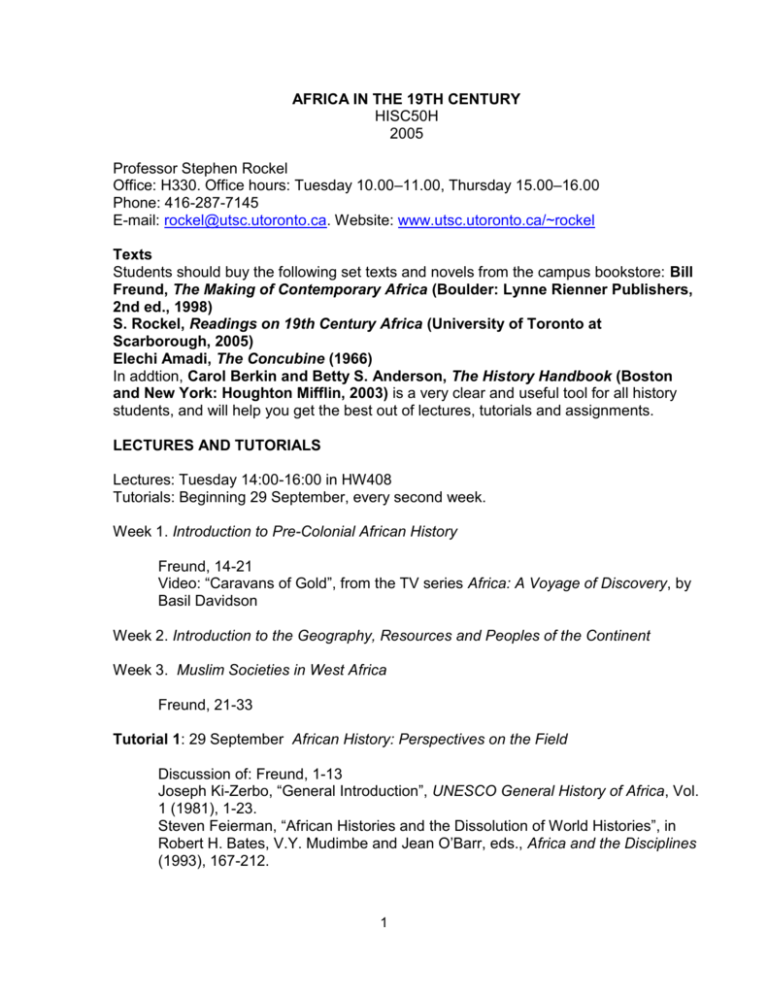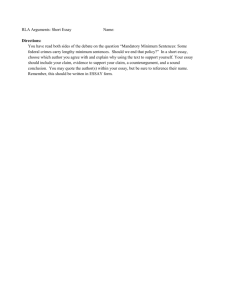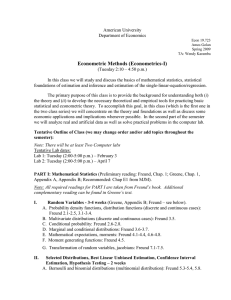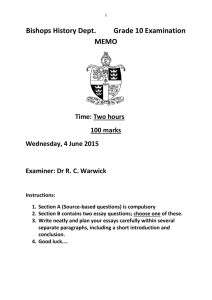AFRICA IN THE 19TH CENTURY - University of Toronto Scarborough
advertisement

AFRICA IN THE 19TH CENTURY HISC50H 2005 Professor Stephen Rockel Office: H330. Office hours: Tuesday 10.00–11.00, Thursday 15.00–16.00 Phone: 416-287-7145 E-mail: rockel@utsc.utoronto.ca. Website: www.utsc.utoronto.ca/~rockel Texts Students should buy the following set texts and novels from the campus bookstore: Bill Freund, The Making of Contemporary Africa (Boulder: Lynne Rienner Publishers, 2nd ed., 1998) S. Rockel, Readings on 19th Century Africa (University of Toronto at Scarborough, 2005) Elechi Amadi, The Concubine (1966) In addtion, Carol Berkin and Betty S. Anderson, The History Handbook (Boston and New York: Houghton Mifflin, 2003) is a very clear and useful tool for all history students, and will help you get the best out of lectures, tutorials and assignments. LECTURES AND TUTORIALS Lectures: Tuesday 14:00-16:00 in HW408 Tutorials: Beginning 29 September, every second week. Week 1. Introduction to Pre-Colonial African History Freund, 14-21 Video: “Caravans of Gold”, from the TV series Africa: A Voyage of Discovery, by Basil Davidson Week 2. Introduction to the Geography, Resources and Peoples of the Continent Week 3. Muslim Societies in West Africa Freund, 21-33 Tutorial 1: 29 September African History: Perspectives on the Field Discussion of: Freund, 1-13 Joseph Ki-Zerbo, “General Introduction”, UNESCO General History of Africa, Vol. 1 (1981), 1-23. Steven Feierman, “African Histories and the Dissolution of World Histories”, in Robert H. Bates, V.Y. Mudimbe and Jean O’Barr, eds., Africa and the Disciplines (1993), 167-212. 1 Week 4. Kingdoms of the Great Lakes Map Quiz (4 October) Week 5. The Atlantic Slave Trade Freund, 34-47 Tutorial 2: 13 October Slavery and the Slave Trade in West Africa John Thornton, “Sexual Demography: The Impact of the Slave Trade on Family Structure”, in Claire C. Robertson and Martin A. Klein, eds., Women and Slavery in Africa (1983), 39-48 Myron Echenberg, “Slaves into Soldiers: Social Origins of the Tirailleurs Senegalais”, in Paul E. Lovejoy, ed., Africans in Bondage: Studies in Slavery and the Slave Trade (1986), 311-333. Ismail Rashid, “‘A Devotion to the Idea of Liberty at Any Price”: Rebellion and Antislavery in the Upper Guinea Coast in the Eighteenth and Nineteenth Centuries”, in Sylviane A. Diouf, ed., Fighting the Slave Trade: West African Strategies (2003), 132-151 Week 6. East Africa: Ivory and Slaves Freund, 58-63 First Essay due (18 October) Week 7. The Southern African Frontier Freund, 47-50, 65-72 Tutorial 3: 27 October Shaka, the Zulu Kingdom, and the Mfecane (or, is Oprah Really Zulu?) John Wright and Carolyn Hamilton, "Ethnicity and Political Change Before 1840", in Robert Morrell, ed., Political Economy and Identities in Kwazulu-Natal (1996), 15-32 Elizabeth A. Eldredge, "Sources of Conflict in Southern Africa c. 1800-1830: The 'Mfecane' Reconsidered", in Carolyn Hamilton, ed., The Mfecane Aftermath: Reconstructive Debates in Southern African History (1995), 123-62 Carolyn Hamilton, "'The Character and Objects of Chaka': A Reconsideration of the Making of Shaka as Mfecane Motor", in Hamilton, The Mfecane Aftermath, 183-211 Dan Wylie, "Violently Representing Shaka", Mots Pluriels, 1, 4 (1997) Week 8. The Impact of the Slave Trade 2 Week 9. African Empires: Ethiopia Tutorial 4: 10 November The Village Community: Idealized or Real? Elechi Amadi, The Concubine (1966) Week 10. African Economies in the Nineteenth Century Freund, 51-58, 63-65 Week 11. The Partition of Africa Freund, 73-96 Second Essay due (22 November) Tutorial 5: 24 November Betwixt and Between: The Dilemas of the Educated Elite Brian Willan, "An African in Kimberley: Sol T. Plaatje, 1894-98", in Shula Marks and Richard Rathbone, eds., Industrialisation and Social Change in South Africa (1982), 238-58 Philip S. Zachernuk, "The Lagos Intelligencia and the Idea of Progess, ca. 18601960", in Toyin Falola, ed., Yoruba Historiography (1991), 147-65 John Iliffe, "The Spokesman: Martin Kayamba", in John Iliffe, ed., Modern Tanzanians (1973), 66-94 Week 12. The Mineral Revolution in Southern Africa Freund, 149-66 COURSE WORK Disabilities Students with a disability/health consideration are encouraged to approach the staff at the AccessAbility Services Office @ 287-7560. They can also drop by the office, S302B, inside the Resource Centre. The Coordinator is available by appointment to assess specific needs, provide referrals and arrange appropriate accommodations. Tutorials Tutorial attendance and participation is essential for this course, and is reflected in the allocation of the final grade. You can earn up to 15% of your grade by contributing to discussions stimulated by the set readings. Assignments 3 The assignments include a a map quiz and two short essays, apart from the regular tutorials. The map quiz is set for the third week lecture period (4 October), and will take only about ten minutes. The first essay should be about 1,000 words (4 double-spaced pages), and the second about 2,000 words (8 double spaced pages). N.B. Late essays will be penalized 1% a day unless you have made prior arrangements or have a valid excuse. Analytical Skills and Essay Organisation It is most important that you develop an analysis of your topic, rather than being merely descriptive. You will want to do your own thinking rather than present a mishmash of other people’s ideas. The use of a plan helps to clarify thought and develop your argument. Start your essay with a clear introduction stating the argument or thesis, and what sort of evidence you will present. In the main body of the essay present your evidence and discuss it. The conclusion should be a short evaluation of your argument in relation to the evidence. Use footnotes or endnotes for all quotations and paraphrases. Include a bibliography at the end of the essay. Keep your notes and a backup copy. Remember that the university has facilities to assist you with improving your written English. Plagiarism Plagiarism is a serious academic offence, and can result in penalties. If you quote and reference your sources honestly and accurately you will have nothing to worry about. If you are not sure how to avoid plagiarism, consult the Calendar or Berkin and Anderson, The History Handbook, or speak with me. If you are suspected of plagiarism an oral test could be used to determine your knowledge of the subject and taken into account in your grade. Deadlines Map quiz: First Essay: Second Essay: 4 October 18 October 22 November Grade Allocation Your grade will be worked out as follows: Map quiz: First essay: Second Essay: Tutorial participation: Final exam: Total: 10% 15% 25% 15% 35% 100% 4











